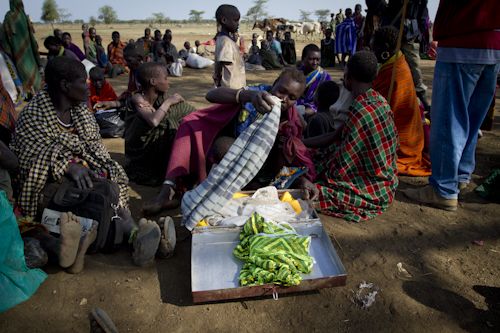Emmanuel Lokwii can’t remember how old he was when his single mother took him, his three younger brothers and sister to Kampala. “I was young,” he says. “Smaller,” he calculates, pointing at his brother Job, 4, sitting head bowed and silent next to him. “This one was still a newborn baby back then.”
But while he might not recall how he got there, Emmanuel, 13, says that what he’ll never forget about his country’s capital was the hunger, hardship, beatings and abuse that he and his siblings faced daily as they scrambled to survive, begging money or scrounging food on the bustling streets.
“Life was so hard,” he says. “There was nowhere to sleep; there was nothing to eat. If we went to the streets and got money we would eat. If not, we wouldn’t.”
Emmanuel is no exception. It’s impossible to estimate the number of Karamojong leaving behind the hunger and insecurity of their inhospitable home for the dangerous life on the streets of Kampala. Often children, usually from the Bokora clan, they almost inevitably end up begging to survive. Vulnerable and undocumented, they face constant abuse--sexual, physical, verbal. But despite the horror stories many see no other option.
Just over 200 miles from Kampala, Karamoja is another world. Driving across country, the tarmac roads fade to dirt tracks as the landscape flattens into the planes of Karamoja.
For generations the region has lagged behind the rest of Uganda. Written off by the country’s British colonial masters as an untamable hinterland, it was neglected and brutalized by a series of post-independence governments. More than any other leader, Yoweri Museveni, the current president, has tried to change Karamoja. But these efforts have been heavy-handed and often unsuccessful, and the Karamojong remain trapped in a prison of stereotypes and discrimination.
Foreigners in their own country, they are separated from the rest of Uganda not only by development statistics but also by a psychological gulf. As local singer John Robert Adupa tells me, “some Ugandans don’t know that Karamoja is under Uganda, and the Karamojong...think that Karamoja is different from Uganda.”
For Emmanuel Lokwii, and the other Karamojong in Kampala, this sense of dislocation translated into daily discrimination.
“The people living there used to shout at us ‘Karamoja, Karamoja get out of here,’” he says. “Kampala was terrible because the people were abusing us with their jeering. They threw stones at us.”
While the ordinary people abused them, government officials offered no comfort. “The people from the city council were the worst. If you ran from them they would catch you and beat you,” Emmanuel says. “Some policemen would beat you too.”
Eventually, it was those officials who sent Emmanuel and his family back to Karamoja. Late last year, in one of the sporadic round-ups of the Karamaojong that the government conducts in Kampala, Emmanuel and his family were hauled off the streets. The government says the round-ups are for the good of the Karamojong, helping them escape the dangers of life in Kampala and resettle back home. But critics say the often brutal operations can separate children from parents and typify the discrimination the Karamojong face. If people from all over Uganda can come and live and work in Kampala, then why do only the Karamojong get sent back home?
Despite the harsh treatment, Emmanuel says he was relieved when the authorities picked him up. The council officials only beat you if you didn’t tell them your name, he says, and although most mornings they were locked in a hot and unhygienic warehouse at the transit camp, it was nothing compared to the abuse they faced on the streets.
Now back in his home region, he and Job are going to school, thanks to a foreign NGO. At first he says he and the other returnees got bullied by peers asking them why they’d come back. Now though, he says he’s settling in.
As he talks to me, a group of his classmates gather round to listen. Usually boisterous, this time they listen in silence to Emmanuel's tales of life in Kampala.
“Life is hard here in Karamoja. There is not enough food to eat and my mother struggles,” Emmanuel says. “But it is still better than the life we used to lead.”
